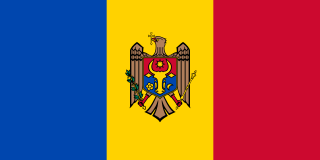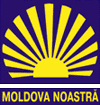See also
| Sovereign states |
|
|---|---|
| States with limited recognition | |
| Dependencies and other entities | |
Fauna of Moldova may refer to:

After achieving independence from the Soviet Union, the Republic of Moldova established relations with other European countries. A course for European Union integration and neutrality define the country's foreign policy guidelines.

Moldova, officially the Republic of Moldova, is a landlocked country in Eastern Europe, on the northeastern corner of the Balkans. The country spans a total of 33,483 km2 (12,928 sq mi) and has a population of approximately 2.5 million as of January 2023. Moldova is bordered by Romania to the west and Ukraine to the north, east, and south. The unrecognised breakaway state of Transnistria lies across the Dniester river on the country's eastern border with Ukraine. Moldova is a unitary parliamentary representative democratic republic with its capital in Chișinău, the country's largest city and main cultural and commercial centre.

Chișinău, formerly known as Kishinev, is the capital and largest city of Moldova. The city is Moldova's main industrial and commercial centre, and is located in the middle of the country, on the river Bîc, a tributary of the Dniester. According to the results of the 2014 census, the city proper had a population of 532,513, while the population of the Municipality of Chișinău was 700,000. Chișinău is the most economically prosperous locality in Moldova and its largest transportation hub. Nearly a third of Moldova's population lives in the metro area.

Transnistria, officially known as the Pridnestrovian Moldavian Republic (PMR), is a breakaway state internationally recognized as part of Moldova. Transnistria controls most of the narrow strip of land between the Dniester river and the Moldova–Ukraine border, as well as some land on the other side of the river's bank. Its capital and largest city is Tiraspol. Transnistria is officially designated by the Republic of Moldova as the Administrative-Territorial Units of the Left Bank of the Dniester or as Stînga Nistrului.

Gagauzia or Gagauz-Yeri, officially the Autonomous Territorial Unit of Gagauzia (ATUG), is an autonomous territorial unit of Moldova. Its autonomy is intended for the local Gagauz people, a Turkic-speaking, primarily Orthodox ethnic group.

The Our Moldova Alliance was a social-liberal political party in Moldova led by Serafim Urechean, former mayor of Chișinău. It merged into the Liberal Democratic Party of Moldova (PLDM) during April 2011.

Southeast Europe or Southeastern Europe (SEE) is a geographical sub-region of Europe, consisting primarily of the cultural region of the Balkans, as well as adjacent regions and archipelagos. There are overlapping and conflicting definitions of the region, due to political, economic, historical, cultural, and geographical considerations.

The Moldova national football team represents Moldova in men's international football and is controlled by the Moldovan Football Federation, the governing body for football in Moldova. Moldova's home ground is Zimbru Stadium in Chișinău and their head coach is Serghei Cleșcenco. Shortly before the break-up of the Soviet Union, they played their first match against Georgia on 2 July 1991.

The Super Liga is an association football league that is currently the top division of Moldovan football league system. The competition was established in 1992, when the country became independent from the Soviet Union. It was formed in place of former Soviet republican competitions that existed since 1945. Before the Soviet occupation of Bessarabia and Northern Bukovina in 1940, clubs from modern Moldova competed in the Romanian football competitions, particularly Nistru Chișinău.

The Republic of Moldova first participated at the Olympic Games as an independent nation in 1994, and has sent athletes to compete in every Olympics since then.

According to the 2014 census, there are 37,241 Moldovan-Americans residing in the United States.

The following outline is provided as an overview of and topical guide to Moldova:
Cahul International Airport is located in southern part of Moldova, 8 km (5.0 mi) south-east of Cahul.

The Moldova national under-21 football team represents Moldova in international football at this age level and is controlled by the Moldovan Football Federation, the governing body for football in Moldova. The team is considered to be the feeder team for the senior Moldovan national football team. The team competes to qualify for the UEFA European Under-21 Championship, held every two years. Since the establishment of the Moldovan under-21 team, the under-21 side has never reached a final tournament of the UEFA European Under-21 Championship, but has produced many players, who have become regular internationals for the senior side. The team is coached by Ștefan Stoica.
The Moldova national under-17 football team represents Moldova in international football at this age level and is controlled by the Moldovan Football Federation, the governing body for football in Moldova. The team competes to qualify for the UEFA European Under-17 Championship held every year. They qualified for the 2002 competition but finished last in the group stage. Players born on or after 1 January 2007 are eligible for the 2024 UEFA European Under-17 Championship qualification. They are currently coached by Vitalie Mardari.
The Moldova national under-19 football team represents Moldova in international football at this age level and is controlled by the Moldovan Football Federation, the governing body for football in Moldova. The team competes to qualify for the UEFA European Under-19 Championship held every year. Since the establishment of the Moldovan under-19 team, the under-19 side has never reached a final tournament of the UEFA European Under-19 Championship. Players born on or after 1 January 2006 are eligible for the 2025 UEFA European Under-19 Championship qualification. They are currently coached by Serghei Cebotari.
According to the Moldovan law on territorial administrative organisation, two or more villages can form together a commune.